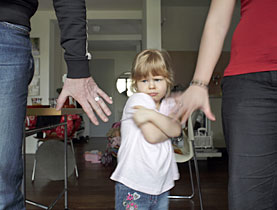Children’s rights “have to be demanded”

Children living in the streets of poor countries are usually the products of complex social, political and economic problems, a child rights expert tells swissinfo.
Thursday’s Universal Children’s Rights Day serves as a reminder that these young people are no longer being considered simply as victims but as a group that has fundamental rights that must be respected, advocates say.
According to the Lausanne-based non-governmental organisation Terre des Hommes, between 50 and 100 million children around the world live and work on the streets.
Following the example of other groups, Terre des Hommes has since 1990 focussed on an approach that is no longer based on a victimisation mentality but on progressive rehabilitation.
Daniel Stoecklin, a sociology professor at the Graduate Institute Kurt Bösch and a researcher at the International Institute for the Rights of the Child in canton Valais, worked for Terre des Hommes between 1998 and 2005. He contributed to the development of this approach.
swissinfo: NGOs that are active in this field no longer speak of a street child but advocate the term “child in street situations”. What does it mean?
Daniel Stoecklin: The expression shows that the child is not the problem, but that the situation that causes them to be on the street is problematic. It also avoids the stigmatisation tied to the term “street child” and shows that there are many reasons for this situation – political, economic, structural and family.
What really has to be understood is that the child who has chosen to go to the streets is generally escaping worse conditions elsewhere.
This forces us to reflect on the quality of the relations the child can develop in the streets, even if we think it’s all very dangerous. In fact, a certain kind of solidarity can be developed in the streets.
swissinfo: How does this new approach influence work in the field?
D.S.: The aim is to allow the children to find means of positive integration for their development. That does not necessarily mean leaving the streets immediately, which isn’t always possible for the simple reason that there are no other alternatives.
Other more realistic ways have to be found, for example, better working conditions for those with street jobs and by favouring progressive measures.
swissinfo: To what extent is the UN’s Convention of the Rights of the Child important for the work of NGOs?
D.S.: A number of research institutes and NGOs work on the basis of this convention. The new methods they apply differ from the protective approach, although this still remains dominant today.
Thanks to these new approaches, the children and the NGOs that support them can demand access to a whole series of fundamental benefits. Countries that have signed the convention have pledged to help in education, health, apprenticeships and protection from violence.
swissinfo: Are children on the street the same all over the world?
D.S.: No, there’s a lot of diversity. In each country there is a different combination of economic, political and social causes. The profiles of children who live in the street are also very different. It goes from the leader of the influential gang who can organise criminal activities, or sometimes work, to the runaway child who lives for several months in the streets before returning home. Obviously poverty or impoverishment is present everywhere.
swissinfo: You have worked on this problem in China. What is the situation there?
D.S.: China is characterised by the very striking feature of a floating population. Most recent estimates, which date from 2000, show that about 150 million people, including 23 million children, have moved from the countryside to the cities. Add to that all the children who have been left with their grandparents in the villages. They are all in a very vulnerable position.
Compared with Brazil, where a large number of NGOs are active, China is lagging behind. But the situation has changed over the past 15 years and NGOs there are also dealing with children on the streets.
swissinfo: What do you think of what Terre des Hommes is doing for International Children’s Rights Day – activities involving 5,000 schoolchildren in Switzerland?
D.S.: This kind of event brings awareness to adults and young people, who can then get an idea of the extremely difficult conditions in which people live elsewhere. Bearing in mind the [financial] crisis which is unfolding, it’s also a reminder that even in a relatively stable country like Switzerland, human rights have to be demanded.
swissinfo, based on an interview in French by Carole Wälti
Terre des Hommes on Thursday organised a special event in Switzerland to make schoolchildren aware of the problems of street children.
About 5,000 of them Swiss children, wearing an orange hat, polished shoes or sold newspapers as street children do all over the world.
Last year, this brought in a total of SFr260,000 ($214,221).
Terre des Hommes works on behalf of children in nine countries – Afghanistan, Bangladesh, Brazil, Burkina Faso, Burundi, Guinea, Madagascar, Senegal and Vietnam.
The UN Convention on the Rights of the Child was adopted on November 20, 1989.
It was the first legally binding international instrument for children that incorporated the full range of human rights – civil, cultural, economic, political and social rights.
Some 190 states have ratified the treaty.
The United States and Somalia have signed it but not ratified it.
Switzerland ratified the convention in 1997.

In compliance with the JTI standards
More: SWI swissinfo.ch certified by the Journalism Trust Initiative











You can find an overview of ongoing debates with our journalists here . Please join us!
If you want to start a conversation about a topic raised in this article or want to report factual errors, email us at english@swissinfo.ch.